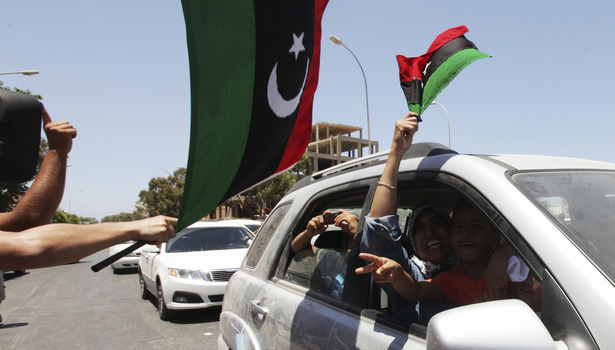
From Karim Mezran, the Atlantic: Nine months after the death of Muammar Qaddafi, Libyans went to vote for the first time since 1965, a major step towards a more pluralistic Libya. The country held the free and fair elections in a state of relative peace and public enthusiasm. Despite 40 years of dictatorship, little training in participatory policy, low levels of education, and fragmented politics, Libyans themselves ensured the success of the elections by flocking to the polls. In the eastern provinces, supporters of federalism — a controversial call to grant Libyan provinces greater autonomy from the capital — tried to undermine the electoral process by attacking some polling stations, yet in all cases except one, were turned away by newly created and impressively disciplined security forces as well as by voters who stood for their rights. That’s the glass-half-full view of the Libyan election, and it’s important. But the glass-half-empty view matters as well.
For all the reasons to celebrate Libya’s election, many in the West might be overestimating the importance of the presumed electoral victory of the secularists and liberals, led by Mahmoud Jibril, who had served as interim prime minister of the revolutionary transitional government during the 2011 conflict. As Jibril himself has stated, calling his party secularist and liberal is a mistake. His is chiefly a nationalist movement. Though some parties are associated with Islamist groups such as the Muslim Brotherhood, none identifies as explicitly Islamist or secularist. This election is actually only for the 80 seats in the new, 200-person legislative assembly that are chosen by voting for party lists rather than individual candidates. The other 120 seats are reserved for independent candidates; no one knows exactly what affiliation they will align themselves with after being elected. It will be at least a few weeks, then, before we can judge which parties or groups will have how much power in the assembly. . . .
There are rumors in Libya that most members of the NTC are not happy about the idea of dissolving the institution and going back home. It’s just a rumor, but the group’s decision to revoke constitution-writing powers from the new assembly is making people suspicious, and that’s the point. The NTC likely fears too much power going to Islamists, who are notoriously less friendly toward the NTC than are other groups. We can’t know the NTC’s motivations for sure, but their recent moves diminished the power of the new assembly, which they may have feared would be dominated by Islamists, who swept national elections in neighboring Tunisia and Egypt. A more democratic Libya would reject the NTC’s odd rule-changing and reinstate the elected assembly’s power to write the constitution. After all, this is what Libyans voted for. So should the same Western powers that supported the Libyan revolt.
Karim Mezran is professor of Middle East and North African Studies at SAIS, Johns Hopkins University and a senior fellow at the Atlantic Council’s Rafik Hariri Center for the Middle East. (photo: Reuters)
Image: reuters%207%2013%2012%20Libya_0.jpg
